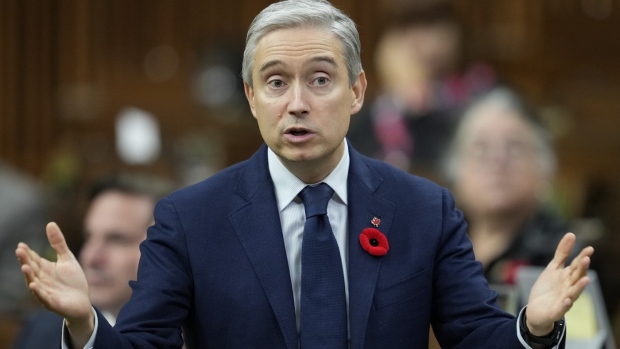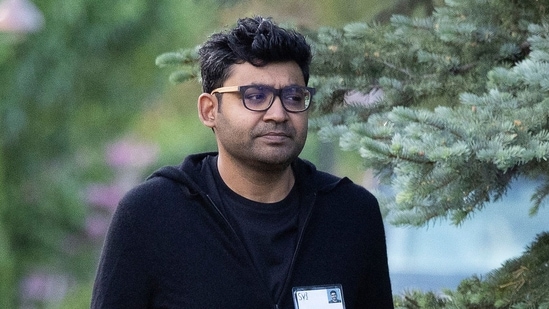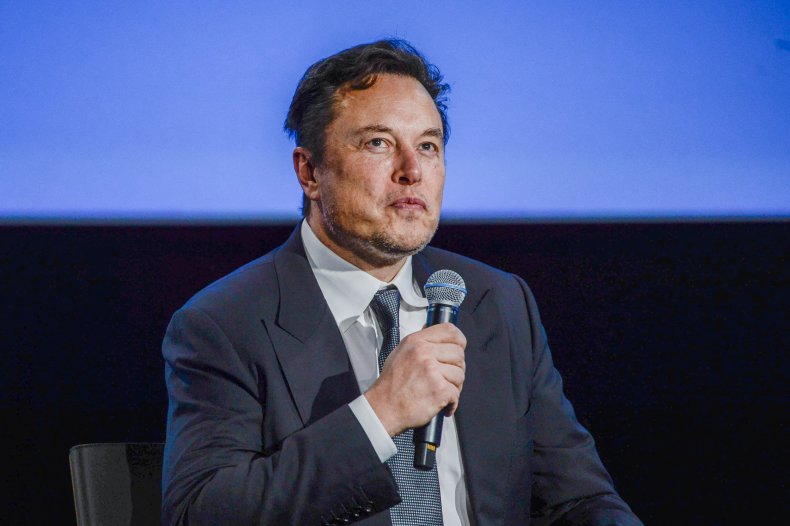CORPORATE PROFITS ARE INFLATION
Higher interest rates will further squeeze food affordability for consumers: Expert
, BNN Bloomberg
Canadian consumers are being squeezed at both ends as higher interest rates impact shelter costs and food affordability, according to Sylvain Charlebois, director of the Agri-Food Analytics Lab at Dalhousie University.
On Wednesday, the Bank of Canada raised interest rates for the sixth-straight time. The central bank hiked its benchmark overnight lending rate by 50 basis points to 3.75 per cent, which was less than the 75-basis-point hike expected by the majority of economists.
Charlebois said this hike will impact food affordability and how much money Canadians can spend on groceries.
“With hikes, food affordability is being compromised on the backhand, as many households will have less money to devote to food, compared to just a few months ago,” Charlebois said over email on Wednesday.
“Higher interest rates will impact shelter costs for many Canadians, another necessity of life. So consumers are now squeezed from both ends of the food affordability continuum.”
Charlebois said this interest rate hike was “very much about our currency” and is “good news for food traders.”
“As we get closer to winter months, we need a stronger dollar for our food importers to keep prices lower for certain sections of the grocery store, mainly produce,” he said.
DOWNWARD PRESSURE ON PRICES
In a press conference on Wednesday, Carolyn Rogers, senior deputy governor at the Bank of Canada, said food retailers have been able to pass on higher input costs to consumers.
But with additional agriculture expenses starting to fall, she said they’ll be watching to see if the price declines are reflected at the grocery store.
“The most important point we can make is that the environment that we're in, an environment of excess demand and high inflation, is the type of environment where retailers including food retailers are most able to pass through pricing increases to consumers,” Rogers said. (can you double check this quote?)
“So our goal of getting them, the excess demand out of the economy, bringing inflation down, will help to restore the competitive pressure and will prevent retailers from just passing through all the costs and will bring the competition back. That'll put downward pressure on prices.”
CANADIAN DOLLAR IMPACT ON FOOD PRICES
As we approach the new year, Charlebois said his biggest worry is how the Canadian dollar could impact food prices.
He added that issues with supply chains and higher commodity prices are starting to ease, and that the dollar could become a main “driver for higher food prices in months to come.”
“The CPI (consumer price index) for September did indicate that our dollar was already a factor in food retail,” he said.
Last week, Statistics Canada reported CPI was up 6.9 per cent in September from a year ago, which was higher than economists predicted.
The government organization said food inflation hit its fastest year-over-year pace since 1981, with prices climbing 11.4 per cent compared to a year ago.
The Bank of Canada’s last interest rate announcement for 2022 is scheduled for Dec. 7.
WATCHING FOR U.S. FED DECISION
The U.S. Federal Reserve is set to make its next interest rate decision on Nov. 2.
On Sept. 21, the U.S. central bank raised rates by 75 basis points for a third straight time and signalled more aggressive hikes down the road.
Charlebois said that the U.S. Federal Reserve’s decision next week could have a big impact on food prices in the months ahead.
“The U.S. Fed’s decision next week will be key, and will have an impact on our own currency, yet again,” he said.
“If our dollar drops further, we could see grocery prices continue to increase in months to come.”
RBC: Canadians expected to lose wealth at pace not seen since early 1990s
, BNN Bloomberg
Canadians’ net wealth is about to fall at its fastest pace in decades as rising interest rates, weakening financial and housing markets all weigh on consumers, according to a report by the Royal Bank of Canada.
In a report released Wednesday, it found that Canadians gained a total of $3.9 trillion in net wealth over the pandemic amid higher home values.
Since then, about $900 billion has been lost as a result of higher rates, and a decline in housing and financial markets, the report states.
In an email to BNN Bloomberg, Carrie Freestone, economist at RBC, said the recent drop is the “largest quarterly decline in net wealth on record” and the “total decline in net wealth that we’re expecting to see will be the largest decline in decades dating back to the early 1990s.”
“We expect a 41 per cent ($1.6 trillion) retracement of those net worth gains from peak-to-trough,” Freestone said in the report.
“While that still won’t retrace all of our pandemic gains, it will nevertheless create a negative ‘wealth effect’ that will drag on consumer spending, even as labour markets soften.”
SPENDING CURTAILMENT TO WEIGH ON ECONOMY
The significant drop in Canadians’ net wealth could have a significant impact on the economy, the report states.
“The dramatic decline in net wealth, combined with rising prices and higher interest rates, will cut roughly $15 billion from household spending in 2023,” Freestone said.
“This is one of the factors that will drive Canada into a recession early next year.”
Freestone said while discretionary spending on areas like home improvement and renovations drove a surge in spending during the pandemic, as rates continue to rise, Canadians will now have to prioritize necessities like food, gas and debt.
“We estimate households will soon have to allocate 15 per cent of their take-home pay just to debt servicing, with half of this attributed to mortgage costs,” she said.
She added that a decline in discretionary items like furniture has already started.
“As this decline deepens, it will weigh on businesses, particularly in the manufacturing sector,” Freestone said.
Rate surprise risks engulfing Bank of Canada in political storm
, Bloomberg News Oct 26, 2022
The Bank of Canada’s interest-rate surprise potentially opens up Governor Tiff Macklem to the accusation that he and his governing council are reacting to political sniping against them, economists said.
The central bank raised its overnight rate by 50 basis points on Wednesday to 3.75 per cent. Traders and a majority of economists polled by Bloomberg were anticipating a larger increase of 75 basis points.
Those expectations were based, in part, on Macklem’s Oct. 14 remarks that the bigger policy risk was under-tightening. Five days later, Statistics Canada reported headline inflation of 6.9 per cent for September, which appeared to the seal the case for a larger hike.
But monetary policy has become a target for some on the political left.
Last weekend, Jagmeet Singh, the leader of the New Democratic Party, said there is “no merit” to the Bank of Canada’s approach to steep rate hikes and argued it unfairly punishes lower-income Canadians. He released a letter addressed to Prime Minister Justin Trudeau that said the central bank was “already laying the groundwork for a recession.” Singh’s party has an alliance with Trudeau’s Liberal government to ensure it can pass key legislation.
“This was a masterclass in how not to communicate,” Andrew Kelvin, chief Canada strategist at Toronto-Dominion Bank, told Bloomberg of the Bank of Canada’s approach. “Surprising dovishly after political figures started suggesting the bank slow the pace of rate hikes will raise questions about commitment and credibility.”
Benjamin Reitzes, an economist at Bank of Montreal, agreed. “One potentially prickly point for policymakers is that a number of politicians have been weighing in on the policy decision in recent weeks, stating that large rate hikes aren’t appropriate anymore,” Reitzes said in report to investors. “Expect plenty of chatter about potential political influence, whether real or perceived.”
Singh praised the central bank’s decision to go with a smaller hike on Wednesday. “It’s a good sign that they’re not moving as aggressively,” he told reporters outside the legislature. “We’ve also heard from other economists saying that we should just pause, that the increased interest rates now will take some time to actually have an impact.”
A former top Liberal aide weighed in this week as well.
Tyler Meredith, who was one of Trudeau’s longest-serving economic advisers until last month, publicly urged Macklem to show “flexibility” and consider easing up. “There is ample evidence for the Bank of Canada to begin to slow down and potentially pause. They should heed it,” Meredith wrote Tuesday in The Globe and Mail newspaper.
Macklem has also come under criticism from the other side of the political spectrum. Conservative Party Leader Pierre Poilievre has targeted Macklem since the early days of the pandemic for allegedly enabling Trudeau’s deficits through purchases of government bonds. Poilievre even promised to fire Macklem, though he has avoided repeating that pledge since his election as leader in September.
All of this led Finance Minister Chrystia Freeland to defend the central bank, telling reporters Tuesday that “institutional stability very much includes the independence of the Bank of Canada.”
‘DIFFICULT DECISIONS’
Asked Wednesday whether his credibility had been damaged, Macklem deflected the question.
“Look, these are difficult decisions,” he said. “I will say that the independence of the central bank becomes more important when the decisions are difficult.”
To some economists, the bank’s decision is all about the evidence of a slowing economy, not politics. The central bank cut its growth projection for 2023 in half, to just 0.9 per cent.
“I think the economic forecast justifies what they did,” said Dominique Lapointe, director of macro strategy at Manulife Investment Management.
Bank of Canada: Read Tiff Macklem's full statement
BNN Bloomberg
The Bank of Canada raised its key policy rate half a point Wednesday taking it to 3.75 per cent.
This marks the sixth consecutive interest rate hike by the central bank since March as it attempts to tame high inflation, which surged 6.9 per cent in September compared to a year earlier — well ahead of the Bank of Canada’s goal of keeping inflation at two per cent.
You can read Macklem's full opening statement below.
"Good morning. I’m pleased to be here with Senior Deputy Governor Carolyn Rogers to discuss today’s policy announcement and the Bank’s Monetary Policy Report (MPR).
Today, we raised the policy interest rate by 50 basis points to 3.75 per cent. This is the sixth consecutive increase since March. Quantitative tightening continues and is complementing increases in the policy rate. We also expect our policy rate will need to rise further. How much further will depend on how monetary policy is working to slow demand, how supply challenges are resolving and how inflation and inflation expectations are responding to this tightening cycle.
Our decision today reflected several considerations.
First, inflation in Canada remains high and broad-based. Inflation has come down in recent months, but we have yet to see a generalized decline in price pressures.
Second, and related, the economy is still in excess demand—it’s overheated. Households and businesses want to buy more goods and services than the economy can produce, and this is driving prices higher.
Third, higher interest rates are beginning to weigh on growth. This is increasingly evident in interest-rate-sensitive parts of the economy, like housing and spending on big-ticket items. But the effects of higher rates will take time to spread through the economy.
Fourth, there are no easy outs to restoring price stability. We need the economy to slow down to rebalance demand and supply and relieve price pressures. We expect growth will stall in the next few quarters—in other words, growth will be close to zero. But once we get through this slowdown, growth will pick up, our economy will grow solidly, and the benefits of low and predictable inflation will be restored.
Finally, we are trying to balance the risks of under- and over-tightening.
If we don’t do enough, Canadians will continue to endure the hardship of high inflation. And they will come to expect persistently high inflation, which will require much higher interest rates and potentially a severe recession to control inflation. Nobody wants that.
If we do too much, we could slow the economy more than needed. And we know that has harmful consequences for people’s ability to service their debts, for their jobs and for their businesses.
This tightening phase will draw to a close. We are getting closer, but we are not there yet.
We are carefully assessing the effects of higher interest rates on economic activity and inflation. And we are being clear with Canadians and focusing on the job we have been assigned—to restore price stability for the benefit of all.
Let me expand on these considerations and highlight the key points in the Governing Council’s deliberations.
The Governing Council began by assessing international developments since the July MPR. Inflation around the world is high and increasingly broad-based. With most central banks raising their policy rates to control inflation, global financial conditions have tightened rapidly. The global economy is slowing, and we revised down our projection for global growth. We also noted the emergence of financial stresses in some markets in recent months.
A number of indicators suggest that global supply disruptions are easing. Oil and other commodity prices have also come down since July. Together with slower global growth, these developments suggest global inflation should come down over time. However, uncertainty is high, particularly related to Russia’s invasion of Ukraine, and there is potential for more volatility in energy markets and for renewed supply chain disruptions.
Turning to Canadian developments, the Governing Council devoted considerable attention to assessing inflation, inflation expectations and the balance between demand and supply in the economy.
Since June, inflation in Canada has come down from 8.1 per cent to 6.9 per cent. Though welcome, most of that decline reflects a drop in gasoline prices. Inflation in Canada is broad-based, reflecting large increases in both goods and services prices. About two-thirds of the components of the consumer price index (CPI) have risen by more than 5 per cent over the last year. And rising prices for essentials like groceries and rent are hitting lower income Canadians particularly hard.
Because short-term movements in total CPI inflation are often dominated by swings in volatile international prices like oil prices, we are watching measures of core inflation closely for signs that price pressures in Canada are easing. Our preferred core measures have stopped rising in the last couple of months, but they have yet to show clear evidence that underlying inflation is coming down. Looking ahead, there are some early encouraging signs. Businesses have said they expect the rate of price increases for the goods and services they sell will come down. And more timely 3-month rates of core inflation have declined, although they are still averaging about 4 per cent. We will need to see these 3-month rates come down further, and those declines be sustained.
We are also looking for evidence that near-term inflation expectations are easing and that longer-term expectations are centred on our 2 per cent target. Near-term expectations remain high and our surveys suggest that uncertainty about where inflation is headed remains unusually elevated.
Looking at indicators of labour markets and economic activity, it is clear that even though the economy has started to slow, it remains in excess demand. Job vacancies have declined from their peak but remain high, and businesses continue to report widespread labour shortages. With the economy now fully reopened, households want to enjoy many of the close-contact services they have missed, but businesses can’t keep up, and we have seen prices for services rise rapidly.
Higher policy interest rates are beginning to slow demand. Higher mortgage rates have contributed to a sharp slowing in housing activity from unsustainable levels, and consumer and business spending on goods is moderating. This has led to declines in house prices and is exerting downward pressure on goods prices.
Moving forward, we expect the effects of higher interest rates to continue to work through the economy, moderating household spending and business investment. Slowing global growth, particularly in the United States, will also weigh on Canadian exports. We project growth in gross domestic product (GDP) will stall through the end of this year and the first half of 2023 before picking up in the second half. Annual average GDP growth is therefore projected to decline from about 3¼ per cent this year to just under 1 per cent next year and about 2 per cent in 2024. With growth below potential for several quarters, excess demand in the economy dissipates and the economy moves into excess supply in 2023.
Putting the global and Canadian outlooks together, we expect inflation will hover around 7 per cent in the final quarter of this year, fall to around 3 per cent by the end of next year and return to the 2 per cent target by the end of 2024.
The Bank of Canada’s job is to ensure inflation is low, stable and predictable. We are still far from that goal. We view the risks around our forecast for inflation to be reasonably balanced, but with inflation so far above our target, we are particularly concerned about the upside risks. We are mindful that adjusting to higher interest rates is difficult for many Canadians. Many households have significant debt loads, and higher interest rates add to their burden. We don’t want this transition to be more difficult than it has to be. But we remain focused on our mandate. Higher interest rates in the short term will bring inflation down in the long term. And getting through this difficult phase will get us back to price stability with sustained growth.
As we move forward, we will be watching carefully to assess the impact of higher rates on spending and how this is feeding through to price pressures. We will also be watching to see how global supply disruptions resolve and to what extent this translates into lower inflation in Canada. Finally, we’ll be watching inflation expectations closely to assess how households and businesses are responding to slowing growth and spending.
With that summary, Senior Deputy Governor Rogers and I are now pleased to take your questions."
With files from David George-Cosh






